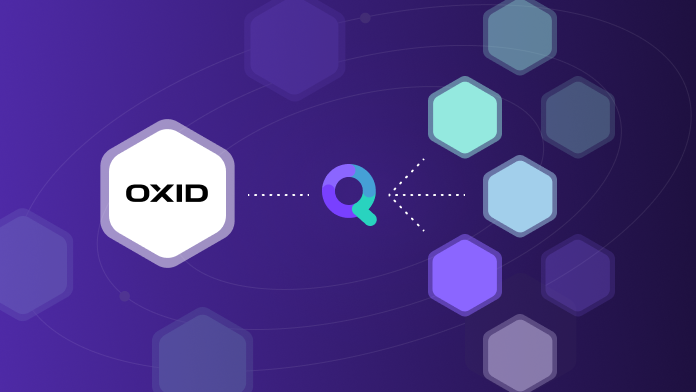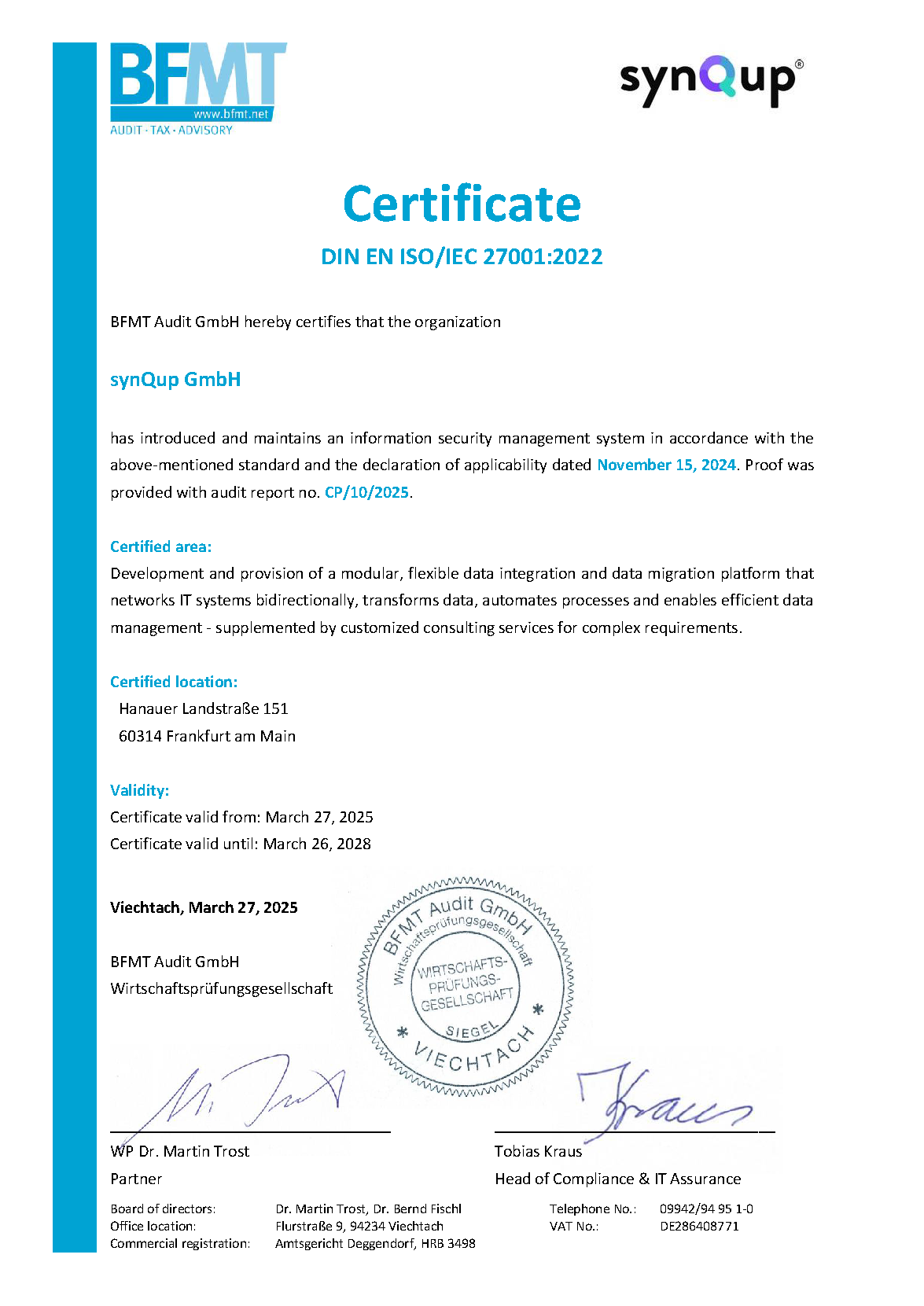Strong together: OXID eShop and synQup in the focus of integration. Here, not only different data sources merge into one big whole. Discover further functionalities of this partnership for your online store in this article!

OXID eSales has been on the market for over 20 years and has built up an excellent reputation in the e-commerce sector. The versatility of the OXID eShop store system developed in-house is particularly evident in the B2B sector, where the system shines with an extensive set of out-of-the-box B2B functionalities.
In the multi-shop and mall concept, the OXID eShop also impresses with one of the most powerful multi-client capabilities on the market. These enable fast and complete localization, ideal for international scenarios. An additional highlight is the ability to aggregate products from different suppliers into a new target group using a marketplace solution.
For a seamless omnichannel experience, the OXID eShop offers the headless API via GraphQL. This enables flexible data transfer between the OXID eShop and various third-party systems to ensure a consistent customer journey across different channels. This is why OXID is also cloud-ready and can be operated as a Platform-as-a-Service (PaaS) by certified partners.
Why is the integration of third-party tools important?
Integration platform-as-a-service (iPaaS) solutions come into play to make the aforementioned data transfer possible. The integration of additional systems via iPaaS, such as synQup, is proving to be a strategically decisive step for e-commerce companies based on the tried-and-tested OXID eShop. By seamlessly connecting various applications, such as payment processing, warehouse management systems and customer databases, iPaaS enables an increase in the efficiency of business processes. This reduces manual tasks, minimizes errors and thus contributes to smoother operations and increased customer satisfaction.
In addition, the use of iPaaS in the context of the OXID eShop offers the possibility of a flexible and scalable architecture. The easy integration of new systems enables a quick response to changing requirements, the introduction of innovative technologies and the adaptation of the e-commerce ecosystem. This strategic integration not only promotes the agility of the company, but also opens up new functionalities and services that create a sustainable competitive advantage.
How does synQup support OXID eShop?
synQup generally enables the smooth integration of ERP, PIM, CRM, DAM and other systems used in your e-commerce business. These systems can communicate with each other and exchange data without you having to constantly switch back and forth between different platforms.
You can find out what this means in concrete terms for use with OXID eShop here:
Full import, export and delta support
Using API integrations, database queries or SFTP uploads, you can use synQup to perform a complete data import into OXID or just update the latest changes in delta mode. It doesn’t matter whether you want to import product data, stock levels, media (e.g. product images or data sheets) or export order information (such as order data, status, tracking links or invoices) or customer data.
Article management
The OXID iPaaS solution also supports item management. Not only can item information such as name, description text, price or stock be created or updated, but item attributes can also be stored, which are crucial for generating variants or filters in the online store. This is because synQup establishes the connection to the product management system like a PIM or ERP system. Technical data and individual fields are crucial for the precise presentation of your products.
Price and tax presentation
Individual customer prices or customer group prices are common in B2B business. Maintaining these prices manually in the store is simply not possible due to time constraints. In addition, these individual prices are usually managed in ERP systems. synQup, however, makes it possible to display the agreed price in the OXID eShop by integrating the store and ERP. The situation is similar with tax information. This often becomes a problem with an international store. Once created in the ERP, this information can be easily transferred to OXID via the iPaaS solution.
Inventory management
Nothing is more frustrating for customers than placing an order and then finding out that the product is no longer available. synQup is therefore in constant communication between your OXID store and the ERP system. Orders that reduce stock levels are transferred from synQup to the ERP at short intervals. Offline orders that reduce stock levels can also be transferred to the store via synQup. This means that stock levels are up-to-date in all relevant systems. This is done via cronjobs.
Categories and manufacturer information
Product categories and categorizations in general play an important role in every online store. synQup supports OXID in keeping the categories up to date. If these are changed in the ERP, this information can be easily transferred. The same applies to manufacturer information. If, for example, a manufacturer is removed from or added to the product range, the automatic transfer can be controlled via synQup.
Multimedia management
In addition to the actual product data, online stores also integrate product images, category images, manufacturer logos or product-related documents. synQup also supports you here. This information is often available in PIM or ERP systems. The iPaaS solution can now either obtain this data from a single source or use multiple sources. In the second case, all data from the source systems is merged into what is to be displayed in the store. For example, product images and videos from source A and product data sheets from source B can be saved on a product. However, customers cannot see that the data has been obtained from different sources.
Customer data management
Customer data, such as address and order data for customers, is usually stored in different systems. It is precisely this data that needs to be linked and kept up to date in all systems. synQup also acts as an intermediary between all important systems (online store, CRM and ERP). For example, if a new customer registers in the OXID store, the information is transferred to the relevant systems via synQup. The same applies when existing data is changed and adapted. The clear advantage is that the data only needs to be adjusted in one place, as synQup can automatically distribute it to all connected systems.
Order management
Managing customer data also involves order management. synQup makes it possible to connect the OXID store to the ERP system. As soon as a customer places an order, the order is transmitted to the ERP via synQup and can be further processed there. Status updates can be exchanged between the ERP and the store so that the customer can view the status of their order at any time via their customer account. Additional information and documents can also be transferred from the ERP to the store, such as tracking links or invoices and delivery bills.
OXID modules
The functions of OXID can also be extended with individual modules. With the help of an iPaaS solution such as synQup, necessary data can be obtained from the source systems and stored in the individual module tables. Imagine, for example, that you want to add a store finder to your website. To be able to operate this, you first need the module. What you then need is the data for the individual stores. This may be in the ERP. With the help of an iPaaS solution such as synQup, the data is transferred to the module tables. The store finder then displays the corresponding stores in the frontend.
Why is synQup also a suitable OXID connector?
These aspects make synQup an ideal OXID integrator:
- Transfer of dynamic custom fields from the ERP/PIM possible
- Transfer of data to individual or third-party module tables
- Automatic transfer via cronjobs of data changes for orders, order updates, documents, etc.
- Local validation of data according to OXID specifications before transfer to OXID
- Detection of anomalies before data deletion in the online store to prevent errors
- High data transfer rate
- High speed when achieving compatibility after an update to a new OXID version
- Clever retry mechanism for failed sync API requests (binary search)
Conclusion
The combination of OXID eSales and synQup is a game changer for store operators. This partnership creates an overall solution that is not only efficient and powerful, but also offers room for growth and customization. In particular, it ensures improved performance and scalability of the online store, which translates into faster loading times, handling a large number of concurrent users and an overall more responsive user experience. Use this synergy to outperform the competition and take your online store to the next level.
Your success starts here and now!

